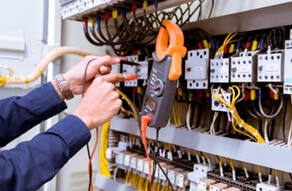Call us now
0439 823 190Blown Fuse – How To Check And Fix
Posted on October 10, 2020

A blown fuse can be easily inspected and also fixed when knowing exactly what to do. The fuse box is what helps control the electricity of the home and helps protect the property from electrical surges. Planning ahead and understanding how the fuse box works will help with the ease of the task. Here at The Local Electrician, our Emergency Electrician team is here to help repair any blown fuse.
To check for a blown fuse located where the main electrical panel is. Unplug devices from outlets, turn off lights, and switch off the power supply to the home. Unscrew the old fuse when everything is safe and replace the old fuse with a replicated one. Turn back on the electrical power, ensure the systems work and call for an electrician if the process was unsuccessful.
Locate the Electrical Panel and Fuse Box
It is important to know where the electrical panel of the home is first before fixing a blown fuse. These are what control the electricity of the property while protecting from short circuits. They are often located within a small metal box or door in one part of the home. The garage, laundry, storage room, basement, attic or hallway are some common locations.
Bigger homes might also have two or more control panels. Older homes usually have the panel situated on the outside close to the electric meter box. If they cannot be found an electrical can perform an electrical safety inspection to quickly identify where it is located.
Inspecting the Fuse Box
When finding where the electrical panel is, knowing if there are circuit breakers or fuses is important. Circuit breakers will be a series of switches while fuses are round that screw into sockets. It is useful if the fuses are labelled so that it is easy to find which fuse controls each area of the home. These labels will be helpful when replacing fuses or tripping circuits need fixing.
Checking for Blown Fuses
To inspect fuse blows often the power will go out within one area or room instead of the whole property. Also, when multiple appliances are connected to power the room or area might lose power. The overloaded circuit will cause the power to go out and the fuses will often blow.
The blown fuse might be cloudy, discoloured or have pieces which are broken or melted. Make sure to not directly touch the fuse especially if it is broken to not be shocked or cause dilemmas.
Causes for Blown Fuses
There are four main ways which will result in a blown fuse:
- Overloaded Circuit – when there are multiple appliances using the power which the fuses can handle this can cause them to overload. Such as many lights being used with heavy appliances, the fuse box can heat up. The electrical circuits using a lot of electrical power will overload the fuse box.
- Short Circuit – when damaged wires make contact with each other this can cause a spike in the electrical current. This issue might happen also from other wiring difficulties or from an appliance plugged into an outlet incorrectly.
- Ground Fault – when a hot wire makes contact with a ground wire, metal control box or wood then it can cause shock. This issue can increase the electrical flow drastically and also cause damage to the fuses.
How to Fix a Broken Fuse
Before completing the task it is important to place extra care on safety and complete early safety measures. Turn off all appliances and lights inside the home to prevent these systems from overloading the new fuse. Making sure that the area is dry is important while water is always not present during the process. Wearing gloves, safety glasses and rubber shoes and removing jewellery will assist in preventing shock.
To fix a broken fuse here are the steps to follow:
- Turn off the main power supply to the building and disconnect any power to the fuse box
- Locate where the blown fuse is and that it is the one which controls the specific area of the house which lost power
- Remove the old fuse by unscrewing it, making sure that it has no electricity running through it
- Replace the old one with an exact replica of the old fuse. These can be purchased from the local hardware store and never replace it with one of a higher amperage. It is also recommended to purchase a few extras in case of future similar problems
- Screw the new replacement fuse on the same electrical part or socket in the panel
- Turn on the main power to the electrical panel and the home. If the fuse still blows then an electrician which is qualified will need to repair the issue
It is extremely important that each step is carried out safely and correctly. Working with electrical systems needs proper care and focus to ensure nor further issues occur. Also, the power needs to be turned off completely to prevent the chance of shocks and electrical fires.
We encourage reading our blog ‘how to test if an electrical wire is live’ to know if the system is off and safe to operate on.
Professional Electricians Repairing Blown Fuses
When needing a reliable emergency electrician to help repair a blown fuse The Local Electrician is here to help. Our 24 hour electricians are able to operate in any property on all blown fuse issues. We will ensure that the blown fuse is repaired correctly using professional techniques. Each job is carried out safely where we will also complete the job on time and efficiently.
Working across Sydney, we will repair any blown fuse, including in South Western Sydney, Inner West and Eastern Suburbs. Our Level 2 Electrician team is also here to help with any advanced job in all types of suburbs.

It is highly recommended that our team is called to help repair any fuse which has blown or experienced damages. We are here 24/7 to help repair a blown fuse – call The Local Electrician on 0439 823 190!
Lifetime Warranty on Workmanship and Labor
Our Services
Our skilled electricians are qualified to carry out any electrical repair or installation within Sydney. We strive to deliver absolute customer satisfaction by offering electrical services that are affordable, safe and long lasting.
- Private Power Pole Installation: What Sydney Homeowners Need To Know - November 29, 2023
- Understanding Power Outages: When To Call a Level 2 Electrician - November 14, 2023
- Understanding Level 2 Electrical Needs: FAQs for Sydney Homeowners - October 7, 2023










